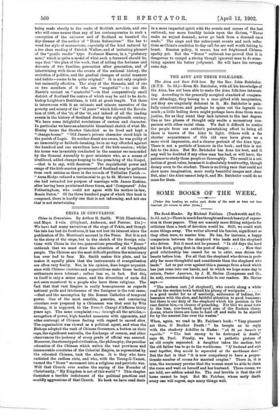SOME BOOKS OF THE WEEK.
[Under this heading we notice such Books of the week as have not been reserved for review in other forms.] The Road-Mender. By Michael Fairless. (Duckworth and Co. 2s.68. net.)—There is much fine thought and much beauty of expres- sion in these papers. They are scarcely more fitting subjects for criticism than a book of devotion would be. Still, we could wish some things away. The writer allowed his fancies, significant as they often were, to master him. He has, for instance, a happy comparison between the shepherd who leads and the shepherd who drives. But it must not be pressed. "In old days the herd led his flock, going first in the post of danger Now that good relationship has ceased for us to exist, man drives the beasts before him. For all that the shepherd who drives is prob- ably far more thoughtful and considerate than the shepherd who leads." Let us put over against this a passage from a book which has just come into our hands, and to which we hope some day to return, Pastor Agnorum, by J. H. Skrine (Longmans and Co., 5s. net), recommending it meanwhile to our readers. Mr. Skrine says :-
" The modern sort [of shepherd], who crawls along a white road to the market town behind his plump of woolpacks is a good model for us of assiduity, endurance of tedium, for- bearance with the slow, and faithful attention to good business ; but there is one duty of the shepherd which his position in the rear denies him,—a chance of preaching. For this we must turn to the lean, sun-burnt, dark-eyed man of the Eastern sheep- downs, where there are lions to fend off and wells to be steered for by the nearest line over the wastes."
When, again, we read in Mr. Fairless's book : " Very pleasant art thou, 0 Brother Death ! " he tempts us to reply with the shadowy Achilles in Hades : " E447 ai got eavartly 7E irapaact." " The last enemy to be destroyed is death," says St. Paul. Finally, we have a pathetic picture of an old couple separated. A daughter takes the mother, but the old father has to go to the workhouse. "If husband and wife went together, they would be separated at the workhouse door." But the fact is that " it is now compulsory to have a propor- tionate number of rooms for married couples." There is, it is true, the necessary proviso that the woman must be able to clean the room and wait on herself and her husband. These rooms, we are told, are seldom asked for. The real trouble is that the old home cannot be kept. But Mr. Fairless, whose early death every one will regret, says many things well.










































 Previous page
Previous page